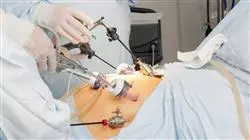University certificate
The world's largest faculty of medicine”
Why study at TECH?
We offer you a quality program that will enable you to expand your skills in the healthcare field. A high-level program for professionals seeking to achieve career success"

Obesity has become one of the main epidemics of the 21st century, worldwide, with an estimated 650 million people affected. The increase in its incidence, the comorbidities that accompany it and that lead to a significant increase in mortality, especially cardiovascular and cancer, the various medical and surgical treatments available, together with the exponential increase in health expenditure that obesity represents, make it a permanent focus of attention.
Prevention in this field is essential, and a multidisciplinary approach aimed at implementing changes in lifestyle, especially physical activity and dietary patterns, should be initiated as early as possible.
This program aims to provide the medical professional with the necessary qualification to implement in a real way a high-level bariatric praxis, considering all its aspects: from the most advanced surgical techniques, to the creation and organization of multidisciplinary teams and their global management. In this way, the student will be able to make a qualitative leap from occasional bariatric practice to the super-specialized bariatric unit.
Throughout this program, the student will go through all the current approaches in the different challenges that their profession poses. A high-level step that will become a process of improvement, not only on a professional level, but also on a personal level. This challenge is one of TECH's social commitments: to help highly qualified professionals to education and develop their personal, social and work skills during the course of the program.
A high-level scientific program, supported by advanced technological development and the teaching experience of the best professionals"
This Advanced Master’s Degree in Obesity and Bariatric Surgery contains the most complete and up-to-date scientific program on the market. The most important features include:
- The latest technology in online teaching software
- A highly visual teaching system, supported by graphic and schematic contents that are easy to assimilate and understand
- Practical cases presented by practising experts
- State-of-the-art interactive video systems
- Teaching supported by remote training
- Continuous updating and retraining systems
- Autonomous learning: full compatibility with other occupations
- Practical exercises for self-evaluation and learning verification.
- Support groups and educational synergies: questions to the expert, debate and knowledge forums
- Communication with the teacher and individual reflection work
- Content that is accessible from any fixed or portable device with an Internet connection
- Supplementary documentation databases are permanently available, even after the program has ended
An educational program created for professionals who aspire for excellence, and that will enable you to acquire new skills and strategies easily and effectively"
Our teaching staff is made up of working professionals. In this way TECH ensures that it delivers the educational update objective it is aiming for. A multidisciplinary team of professionals prepared and experienced in different environments, who will develop theoretical knowledge efficiently, but, above all, will put at the service of the program the practical knowledge from their own experience.
This mastery of the subject matter is complemented by the effectiveness of the methodological design of this Advanced Master's Degree. Developed by a multidisciplinary team of E-Learning experts, it integrates the latest advances in educational technology. In this way, the students will be able to study with a set of comfortable and versatile multimedia tools that will give them the operability they need in their training.
The design of this program is based on Problem-Based Learning, an approach that views learning as a highly practical process. To achieve this remotely, TECH will use telepractice. With the help of an innovative interactive video system, and learning from an expert, the student will be able will be able to acquire the knowledge as if you were actually dealing with the facing you are learning about. A concept that will allow students to integrate and memorize what they have learnt in a more realistic and permanent way.
With this program, you will learn to master the most advanced procedures and techniques to improve the health of your patients"

We have the best teaching methodology and a multitude of simulated cases that will help you prepare for real situations"
Syllabus
The contents of this specialisation have been developed by the different teachers of this program, with a clear purpose: to ensure that our students acquire each and every one of the necessary skills to become true experts in this field. The content of this program enables you to learn all aspects of the different disciplines involved in this field. A complete and well-structured program that will take you to the highest standards of quality and success.

Through a very well compartmentalized approach, you will be able to access the most advanced knowledge of the moment to safely develop your daily work”
Module 1. General Aspects of Obesity
1.1. Obesity and Overweight
1.1.1. Introduction
1.1.2. Definition of Obesity
1.1.3. Epidemiology
1.1.4. Pathophysiology
1.1.5. Energy Intake
1.1.6. Metabolism and Energy Expenditure
1.1.7. Mechanisms of Action in Bariatric Surgery
1.1.8. Etiology: Genetics and Epigenetics of Obesity Syndromes with Dysmorphic Obesity
1.1.9. Initial Evaluation of Obesity
1.1.9.1. Body Mass Index
1.1.9.2. Waist Circumference
1.1.9.3. Body Fat Percentage
1.1.9.4. Other Parameters
1.1.10. Evaluation of Patient Risk
1.2. Major Comorbidities
1.2.1. Definition of Major and Minor Comorbidity
1.2.2. Diabetes Mellitus Type 2
1.2.2.1. Prediabetes and Diabetes: Definition
1.2.2.2. Dietary Treatment
1.2.2.3. Oral Anti-diabetic Treatment
1.2.2.4. Insulin Treatment
1.2.2.5. Target Organ Involvement: Signs and Symptoms
1.2.3. Hyperlipidemia
1.2.3.1. Total Cholesterol
1.2.3.2. HDL and LDL
1.2.3.3. Triglycerides
1.2.4. Cardiovascular
1.2.4.1. Cardiac: Ischemic Heart Disease
1.2.4.2. Vascular
1.2.4.2.1. Venous Stasis with Increased Risk of DVT/PTE
1.2.4.2.2. High Blood Pressure
1.2.5. Metabolic Syndrome
1.2.6. Respiratory: Hypoventilation Syndrome and Apnea-Hypopnea Syndrome
1.2.7. Load-Bearing Arthropathy: Definition and Common Injuries
1.2.8. Infertility
1.3. Minor Comorbidities
1.3.1. Digestive
1.3.1.1. Hepatic Steatosis, Steatohepatitis and Cirrhosis
1.3.1.2. Colelitiasis, Colecistitis
1.3.1.3. Gastroesophageal Reflux Diseases.
1.3.2. Obesity and Cancer: Incidence
1.3.3. Asthma
1.3.4. Hypothyroidism
1.3.5. Incontinence
1.3.6. Psychological Alterations (Major or Minor?)
1.3.7. Other Minor Comorbidities
1.4. Dietary and Pharmacological Treatment
1.4.1. Dietary Treatment
1.4.1.1. Introduction
1.4.1.2. Food plan Dietary Treatment
1.4.1.3. Distribution of Macronutrients in the Diet
1.4.1.4. Modification of Diet Structure
1.4.1.5. General Recommendations for Hypocaloric Diets
1.4.2. Medical Treatment
1.4.2.1. Types of Drugs
1.4.2.2. Drugs Which Affect Appetite and Fullness
1.4.2.3. Drugs Which Work on a Gastrointestinal Level
1.4.2.4. Thermogenic Drugs
1.4.2.5. Other Drugs
1.4.2.6. Medication being Researched
1.4.2.7. Therapeutic Algorithms
1.5. Physical Activity
1.5.1. Program Objectives
1.5.2. Types of Exercise
1.5.3. Frequency, Duration and Intensity
1.5.4. Behaviour Modification
1.6. Indications of Endoscopic and Surgical Treatments
1.6.1. According to BMI
1.6.2. According to Previous Surgery
1.6.3. According to Associated Comorbidities
1.6.4. Listening to the Patient
1.6.5. Therapeutic Algorithms
1.7. Pre-Operative Study
1.7.1. Basic Preoperative Process
1.7.2. Upper Digestive Tract Study: Endoscopy vs. Rx
1.7.3. Study and Eradication of Helicobacter Pylori: When and How
1.7.4. ASMBS Micronutrient Survey and Grades of Recommendations
1.7.5. Indications from Other Studies
1.7.5.1. Respiratory: Functional Respiratory Tests and Polysomnography
1.7.5.2. Digestive: Ultrasound and CAT
1.7.5.3. Cardiac: ECG and Stress Test
1.7.5.4. Movement: Antigravity Treadmill Test
1.7.5.5. DMT2. Hb Glycated A1, Pancreatic Reserve, and Pancreatic Antibodies
1.7.5.6. Studies of Venous Circulation in Lower Limbs
1.7.6. Pre-Anaesthesia Assessment in on Bariatric Surgery
1.8. Pre-Surgery Preparation
1.8.1. Pre-Surgery Preparation
1.8.2. Duration, Objectives and Scientific Evidence Related to Preparation
1.8.3. Liquid Diet
1.8.4. Physical Activity
1.8.5. Respiratory Physiotherapy and Tobacco Consumption
1.8.6. Study and Control of Arterial Hypertension
1.8.7. Pre-Bariatric Surgery Glycemic Control
1.9. Surgical Technique Selection
1.9.1. According to BMI
1.9.2. According to Psychological and Nutritional Profile
1.9.3. According to Associated Comorbidities
1.9.4. Listening to the Patient
1.9.5. Recommended Algorithm
1.10. Indications and Technique Selection in Special Groups
1.10.1. Adolescents and Children
1.10.1.1. Children vs Adolescents: How to Identify Them
1.10.1.2. Bridging Techniques vs. Definitive Techniques: to Whom and Which
1.10.2. Over the Age of 60
1.10.2.1. How to Differentiate between Biological Age and Theoretical Age?
1.10.2.2. Specific Techniques in 60-Year-Olds
1.10.3. BMI 30-35
1.10.3.1. Indication for Surgery
1.10.3.2. Surgical Techniques.
1.10.4. Other Borderline Patients
1.10.4.1. IMC 1.10.4.2. BMI 30-35 and C-peptide=0
1.10.4.3. BMI 30 and 35 and DMT1
1.10.4.4. Over the Age of 70
1.10.4.5. HIV Patients
1.10.4.6. Liver Cirrhosis Patients
Module 2. Physiology of Appetite and Weight Control Pathophysiology
2.1. Energy Balance
2.2. Adequate Energy Intake: Estimation of Energy Expenditure
2.2.1. Basal Metabolism
2.2.2. Voluntary and Involuntary Physical Activity
2.2.3. Total Energy Expenditure
2.3. Nutritional Assessment
2.3.1. Dietary Surveys
2.4. Gastrointestinal Hormones in the Regulation of Body Weight
2.4.1. Ghrelin
2.4.2. Obestatin
2.4.3. Cholecystokinin
2.4.4. GLP-1 and Others
2.5. Leptin in Body Weight Regulation
2.6. Metabolic Signals and Weight Control
2.6.1. Blood Sugar Levels
2.6.2. Fats
2.7. Hypothalamic Control of Food Intake
2.8. Adipose Tissue as an Endocrine Organ
2.8.1. Adipogenesis
2.8.2. Fat Cell Function in Obesity
2.9. Gut Microbiota and its Influence on the Development of Obesity
2.10. Healthy Nutrition
Module 3. Etiopathogenesis of Obesity
3.1. Genetic Factors of Obesity
3.1.1. Monogenic Obesity
3.1.2. Polygenic Obesity
3.2. Epigenetics of Obesity
3.3. Secondary Obesity
3.3.1. Endocrinopathy
3.3.2. Drugs:
3.4. Nutritional Genomics
3.4.1. Nutrigenetics
3.4.2.Nutrigenomics
3.5. Environmental Factors and Obesity (I): Changes in Eating Pattern
3.6. Environmental Factors and Obesity (II): Changes in Physical Activity
3.7. Endocrine Disruptors: Obesogens
3.8. Socioeconomic Status and Obesity. Environment and Obesity
3.9. Chronodisruption and Obesity
3.10. Sarcopenic Obesity
Module 4. History Definition. Diagnosis and Classification. Epidemiology
4.1. Definition. Obesity through the Ages
4.2. Diagnosis
4.2.1. Body Mass Index
4.2.2. Waist Circumference
4.2.3. Body Composition
4.3. Classification Based on Impact of Disease
4.3.1. ABCD
4.3.2. Edmonton Obesity Staging System
4.4. Epidemiology of Childhood Obesity
4.5. Epidemiology of Adult Obesity
4.6. Phenotypic Characterization of Obese Patients
4.6.1. Body composition
4.6.2. Energy Expenditure
4.6.3. Associated Comorbidities
4.6.4. Compulsive Score
4.7. Epidemiology of the Complications
4.8. Obesity in Different Stages of Life
4.9. Metabolically Healthy Obese People
4.10. New Technologies in Obesity Management
Module 5. Comorbidities of Obesity
5.1. Diabetes Mellitus Type 2 and Obesity
5.1.1. Diabesity
5.1.2. Pathophysiology
5.1.3. Prediabetes
5.2. Arterial Hypertension and Obesity
5.2.1. Mechanisms
5.3. Dyslipidemia and Obesity
5.3.1. Atherogenic Dyslipemia
5.3.2. Pathogenesis
5.4. Metabolic Syndrome. Heart Disease. Peripheral Vascular Disease and Peripheral Venous Insufficiency
5.4.1. Diagnostic Criteria in Metabolic Syndrome
5.5. Obesity and Cancer
5.5.1. Molecular Mechanisms
5.6. Respiratory Disorders and Obesity
5.6.1. Apnea-Hypopnea Syndrome Associated with Obesity
5.6.2. Obesity Hypoventilation Syndrome
5.6.3. Bronchial Asthma
5.7. Digestive Diseases and Obesity
5.7.1. Non-Alcoholic Steatohepatitis
5.7.2. Gastroesophageal Reflux Diseases
5.7.3. Cholelithiasis
5.8. Gonadotropic Axis and Obesity
5.9. Other Pathologies Associated to Obesity (Articular, etc.)
5.10. Obesity and COVID-19 Pandemic
Module 6. Prevention of Obesity and Its Comorbidities
6.1. Childhood Obesity
6.2. Prevention of Childhood Obesity I: Importance of Physical Activity
6.3. Prevention of Childhood Obesity II: Importance of Education and Treatment
6.4. Women and Weight Control
6.5. Strategies for the Prevention of Overweight and Obesity
6.5.1. International Strategies
6.6. The Heart and Diabetes
6.6.1. Evaluation of Cardiovascular Risk
6.7. Basis of the Therapeutic Approach
6.8. Multidisciplinary Team in the Treatment of Obesity
6.9. Health Systems Costs of Obesity
6.10. Care and Obesity: Cities Alliance Against Obesity
Module 7. Dietary Treatment of Obesity
7.1. Carbohydrates and Proteins in the Prevention and Treatment of Obesity
7.2. Dietary Fat and its Role in Body Weight Regulation
7.3. Balanced Low-Calorie Diet. Eating Patterns
7.3.1. Nutrient Distribution
7.4. Exchange Diet
7.4.1. Plan
7.4.2. Menus
7.5. The Mediterranean Diet: Prevention and Treatment of Obesity
7.5.1. PREDIMED
7.6. Food Groups: Light and Functional Foods
7.7. Magic or Miracle Diets
7.7.1. Dissociated Diets
7.7.2. Exclusion Diets
7.7.3. Fasting Diet
7.8. Very Low-Calorie Diet
7.9. Diets and Maintaining Weight Lost
7.10. Diet in the Treatment of Comorbidities
Module 8. Physical Activity and Obesity
8.1. Influence of Physical Activity on Energy Balance
8.2. Functional Assessment of an Obese Patien
8.2.1. Motor Skills
8.2.2. Flexibility
8.2.3. Muscular Strength
8.2.4. Cardio-Respiratory
8.3. Functional Assessment of Obesity Comorbidities
8.4. Quantification of Physical Activity (Questionnaires, Records, etc.).
8.5. Types of Physical Exercise in Obesity Treatment
8.5.1. Aerobic
8.5.2. HIIT
8.5.3. Strength Training
8.6. Principles of Physical Exercise.
8.6.1. Frequency (F)
8.6.2. Duration
8.6.3. Intensity
8.7. Physical Activity in Childhood and Adolescence in the Prevention of the Overweight and the Obese
8.8. Physical Activity: Guidelines and Consensus
8.9. Cardio-Respiratory Rehabilitation and Mechanics of Obese Patients. Rehabilitation after Bariatric Surgery
8.10. Importance of Physical Activity in Maintaining Weight
Module 9. Psychological and Psychiatric Aspects of Obesity
9.1. Body Image, Social Stereotypes and the Stigmatization of Obesity
9.1.1. Obesity Throughout History
9.1.2. Dieting and the Weight Loss Industry
9.2. The Role of Emotional Factors, Anxiety Disorders, State of Mind and ADHD in Obesity
9.2.1. Eating to Alleviate Psychological Distress
9.2.2. Anxiety
9.2.3. Depression
9.2.4. ADHD
9.2.5. Other Psychological Factors
9.3. Eating Disorders and Food Intake (DSM 5)
9.3.1. Pica
9.3.2. Rumination Disorder
9.3.3. Food Avoidance/Restriction of Food Intake Disorder
9.3.4. Anorexia Nervosa
9.3.5. Bulimia Nervosa
9.3.6. Binge Eating Disorder
9.3.7. Other Disorders: Night Eating Syndrome
9.4. Explanatory Models, Differential Diagnosis and the Treatment of Eating Disorder Comorbidities in Obesity
9.4.1. Obesity, Binge Eating Disorder and the Food Restriction Theory
9.5. Techniques to Promote Motivation to Change
9.5.1. Importance of the Therapeutic Relationship
9.5.2. Transtheoretical Model of Prochaska and Di Clemente
9.5.3. Motivational Interview of Miller and Rollnick
9.6. Psychological Assessment in Bariatric Surgery
9.6.1. Areas of Evaluation and Contraindications
9.7. Psychological Intervention in Obesity Treatment
9.7.1. Cognitive-Behavioural Treatment Program. Efficient Techniques
9.7.2. Relapse Prevention
9.8. Group Treatment Programs
9.8.1. Intervention Focused on Cognitive Distortions
9.8.2. Self-help Groups
9.9. Psychological Intervention in Childhood Obesity
9.9.1. Habit and Behaviour Modifications
9.10. Prevention of Obesity and Eating Disorders
9.10.1. Early Identification of Risk Factors
9.10.2. Prevention Workshops
Module 10. Pharmacological Treatment of Obesity
10.1. Orlistat
10.1.1. Xendos Study
10.2. Liraglutide
10.2.1. Scale Study
10.3. Naltrexone/ Bupropion
10.3.1. COR Study
10.4. Anti-Obesity Drugs: When to Use Them and How Long to Use Them
10.4.1. Treatment Algorithms
10.5. Commercialized Drugs in Europe
10.6. Non-Commercialized Drugs in Europe
10.7. Drugs Causing Unintentional Weight Loss
10.8. Miracle Drugs
10.9. Future Treatments of Obesity
10.10. Pharmacokinetic Modifications in the Obese Patient Before and After Bariatric Surgery
Module 11. Surgical Treatment of Obesity
11.1. Evidence Levels
11.2. Indications and Contraindications
11.3. Preoperative Evaluation and Patient Selection
11.4. Surgical Techniques
11.4.1. Malabsorptive
11.4.2. Restrictive
11.4.3. Mixed
11.5. Metabolic and Adaptive Surgery
11.6. Bariatric Surgery Complications
11.7. Bariatric Surgery Emergencies
11.8. Postoperative Follow-Up
11.9. Gestation After Bariatric Surgery
11.10. Future of Bariatric Surgery
Module 12. Endoscopic and Percutaneous Treatments in Obesity
12.1. Intragastric balloon (Oballon, ELIPSE)
12.2. Endobarrier
12.3 Vertical Endoluminal Gastroplasty (EndoCinch)
12.4. Transoral Gastroplasty (TOGA)
12.5. Endoscopic Plication (Apollo)
12.6. Gastric Electrical Stimulation (Gastric Pacemaker)
12.7. Neurostimulation of the Dermatomes of the Abdomen
12.8. Neurostimulation of the Dermatomes of the Abdomen
12.9. POSE
12.10. ASPIRE Method
Module 13. Endoscopic Treatment of Obesity and the Overweight
13.1. History of Surgical Treatment of Morbid Obesity
13.2. Adjustable Gastric Band
13.3. Vertical Gastrectomy
13.4. Gastric Bypass Roux-en-Y
13.5. Gastric Bypass of One Anastomosis
13.6. Biliopancreatic Diversion
13.7. Duodenal Crossover
13.8. ADIS
13.9. Nissen-Sleeve
13.10. Other techniques: SASI, Intestinal Bipartition, Gastric Plication, Banding Techniques
Module 14. Perioperative Management
14.1. ERAS Program in Bariatric Surgery
14.2. Multidisciplinary Management of the Bariatric Patient
14.3. Patient Information, Objectives and Establishing Realistic Expectations
14.4. Psychological Assessment
14.5. Perioperative Nutritional Management for Patients Put Forward for Bariatric Surgery
14.6. Thromboembolic Prophylaxis in Bariatric Surgery Prevention Measures for Surgical Site Infections
14.7. Antiemetic Prophylaxis and Goal-Directed Fluid Therapy
14.8. Early Mobilization and Reintroduction or Oral Feeding
14.9. Impact of Physical Training Programs on the Maintenance of Weight Loss Before and After Bariatric Surgery
14.10. Optimization of Comorbidities Prior to Bariatric Surgery
Module 15. Bariatric Surgery Patient Emergencies
15.1. Semiology of Abdominal Pathology and Complementary Explorations in Emergencies in Patients with a History of Bariatric Surgery
15.2. Complications of Endoscopis Procedures (Intragastric Balloon, POSE, (Apollo).
15.3. Fistula Management After Bariatric Surgery
15.4. Intestinal Obstruction of the Upper and Lower Digestive Tract (Bridles, Internal Hernias, Trocars, etc.) after Bariatric Surgery
15.5. Acute Digestive Complications: Marginal Ulcer of Anastomotic, Stenosis, Diarrhea, Proctalgia
15.6. Management of Bleeding after Bariatric Surgery (Upper GI Hemorrhage, Hemoperitoneum)
15.7. Hepato-Biliary Complications Secondary to Post-Surgical Intestinal Malabsorption. Bacterial Overgrowth
15.8. Medical Complications Related to Bariatric Surgery (Dumping Syndrome, Reactive Hypoglycemia, Cardiopulmonary, Renal)
15.9. Nutritional or Toxic Deficiency Emergencies
15.10. Chronic Pain after Bariatric Surgery: A Challenge for the Multidisciplinary Team
Module 16. Revisional Bariatric Surgery (RBS)
16.1. Definition and Indications of Revision Surgery
16.2. Revision Surgery of Techniques No-Longer Used
16.3. Revision Surgery Following Adjustable Gastric Band
16.4. Revision Surgery after a Vertical Gastrectomy
16.5. Revision Surgery after a Gastric Bypass
16.6. Revision Surgery after a One Anastomosis Bypass
16.7. Revision Surgery after a Duodenal Crossover
16.8. Revision surgery after BPD
16.9. Revision surgery after SADI-S
16.10. Role of Endoscopic Surgery in the Management of Complications and Weight Regain
Module 17. Postoperative Follow-Up and Supplementation
17.1. Postoperative Follow-Up and Screening for Nutritional Deficiencies
17.2. Postoperative Supplementation Mineral and Vitamin Supplements
17.3. Nutritional Recommendations after Restrictive Techniques
17.4. Nutritional Recommendations after Mixed Techniques
17.5. Nutritional Recommendations after Malabsorptive Techniques
17.6. Nutritional Management of Patients Suffering from Complications (Critical Patients)
17.7. Specific Nutritional Requirements in Children and Adolescents
17.8. Special Nutritional Requirements in the Elderly
17.9. Special Nutritional Requirements in Women (Pregnancy, Breastfeeding and Menopause)
17.10. Postoperative Management of Specific Complications: Anemia, Protein Malnutrition and Neurological Disorders
Module 18. Basics of Metabolic Surgery
18.1. Metabolic Syndrome and Mediators of Inflammation
18.2. Pathophysiology of Diabetes Medical and Dietary Treatment of Diabetes
18.3. Role of Gastrointestinal Hormones in the Resolution of Type 2 Diabetes Mellitus after Bariatric Surgery
18.4. Concept of Metabolic Surgery, Concept and Scientific Evidence
18.5. Importance of Loop Lengths in Bariatric Surgery
18.6. Influence of the Microbiota in Bariatric Surgery
18.7. Obesity and NASH Role of the Liver as Metabolism Regulator
18.8. Influence of Bile Acids
18.9. Influence of Bariatric Surgery on Hypogonadism and Polycystic Ovary Syndrome (POS)
18.10. Timing of Metabolic Surgery and Its Effect on the Pancreas
Module 19. Transplantation, Abdominal Wall and Special Situations in Bariatric Surgery
19.1. Technical Considerations in the Perioperative Management of the Morbidly Obese Patient with Associated Abdominal Wall Pathology
19.2. Solid Organ Transplant and Bariatric Surgery
19.3. Obesity and Gastroesophageal Reflux
19.4. Management of a Morbidly Obese Patient What is the Ideal Strategy?
19.5. Surgery of the Patient with BMI <35
19.6. Pregnancy and Bariatric Surgery
19.7. Adolescents and Bariatric Surgery Technique and Results
19.8. Effects of Bariatric Surgery on Bone Metabolism
19.9. Other Special Situations in Bariatric Surgery
19.10. Sarcopenia and Loss of Muscle Mass
Module 20. Innovation, Quality of Life, Training and Clinical Management in Bariatric Surgery
20.1. Application of Robotics in Bariatric Surgery
20.2. Application of NOTES and Single Port in Bariatric Surgery
20.3. Quality of Life after Bariatric Surgery
20.4. Bariatric Surgery Cost-Benefit Studies
20.5. Waiting List Management and Candidates Selection in Bariatric Surgery
20.6. Experimental Animal and Thiel Cadaver Training in Bariatric Surgery
20.7. Bariatric Tourism
20.8. Quality Standards after Bariatric Surgery. What is the Current Evidence?
20.9. Aesthetic and Body Contouring Surgery
20.10. Creation of Behavioral Therapy Programs for Maintaining Weight Loss after Surgery

A comprehensive specialized program that will take you through the necessary training to compete with the best in your profession”
Advanced Master's Degree in Obesity and Bariatric Surgery
The study and treatment of obesity is a field in constant updating, since obesity is not only a disease with high risk of morbidity, but also a public health problem worldwide. This designation, approved by the WHO, has favored the development and implementation of new processes and surgical techniques to intervene more effectively in patients with this disease. In order to guarantee the updating of the medical professional in this area, TECH Global University created the Advanced Master's Degree in Obesity and Bariatric Surgery, a complete program that offers the necessary specialization to improve surgical practice. Thanks to the curriculum, the professional will be able to take advantage of the most important elements of the Multidisciplinary Obesity Team, create or strengthen the EMO and use the appropriate intervention techniques for each case. In addition, they will acquire qualities that will enhance their personal development, such as confidence and leadership. Among the objectives of the program is the promotion of these skills in the management of relations between associated multidisciplinary departments, in the organization of the administrative aspects of Bariatric Surgery Units and in the strengthening of medical care for morbidly obese patients.
Postgraduate course in obesity and bariatric surgery
The constant increase in the number of patients admitted to medical units for obesity and its respective comorbidities, as well as the increase in health care costs to cover patient care, make this disease a permanent focus of attention. Although prevention of this condition is essential, it is not always sufficient. In cases where obesity becomes a real pathology for patients, it is necessary to have a specialized medical practice, focused on the use of current surgical procedures. With this Advanced Master's Degree offered by TECH, it will be possible for the medical professional to refine his technical skills in the execution of this type of surgery, applying correctly and exhaustively the perioperative management protocols and guaranteeing his patients a specialized care. Likewise, he/she will have key skills for the diagnosis and intervention of medical pictures of patients with obesity, since he/she will face cases in which he/she will have to evaluate the failures in bariatric surgery and draw up surgical plans to solve these failures.







